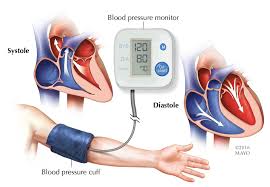High blood pressure, or hypertension, is often called the “silent killer” because it usually has no symptoms but can cause serious complications like heart attacks, strokes, and kidney failure. It affects millions worldwide and is one of the most common cardiovascular conditions. While medication can help manage high blood pressure, natural strategies play a powerful role in both prevention and control.
In this article, we’ll explore the main causes of high blood pressure and discuss effective natural remedies and lifestyle changes for long-term management.
What is High Blood Pressure?
Blood pressure is the force of blood pushing against the walls of your arteries. It is measured in millimeters of mercury (mmHg) and recorded as two numbers:
- Systolic (upper number): Pressure during heartbeats
- Diastolic (lower number): Pressure between beats
A normal reading is around 120/80 mmHg. A consistent reading of 130/80 mmHg or higher is considered high blood pressure.
Common Causes of High Blood Pressure
Poor Diet
Consuming too much salt, unhealthy fats, and processed foods increases blood pressure. Excess sodium causes fluid retention, which puts extra pressure on blood vessels.
Lack of Physical Activity
A sedentary lifestyle contributes to weight gain and weakens the heart, making it harder to pump blood efficiently.
Obesity and Excess Weight
Being overweight strains the circulatory system, increasing blood pressure and the risk of other heart-related problems.
Chronic Stress
Ongoing emotional stress triggers hormone surges like cortisol and adrenaline, which cause temporary spikes in blood pressure. Over time, this may contribute to sustained hypertension.
Smoking and Alcohol Consumption
- Smoking damages blood vessels, hardening arteries and raising pressure.
- Excess alcohol interferes with the body’s ability to regulate blood pressure and may lead to weight gain.
Genetics and Age
If high blood pressure runs in your family, your risk increases. Blood vessels also become stiffer with age, raising systolic pressure.
Medical Conditions
Certain health issues can cause or worsen hypertension:
- Kidney disease
- Thyroid disorders
- Sleep apnea
- Diabetes
Natural Ways to Manage High Blood Pressure
Eat a Heart-Healthy Diet
The DASH diet (Dietary Approaches to Stop Hypertension) is highly recommended. It emphasizes:
- Fruits and vegetables
- Whole grains
- Lean proteins (chicken, fish, legumes)
- Low-fat dairy
- Limited sodium (under 1,500 mg/day)
Add potassium-rich foods like bananas, spinach, and sweet potatoes to help balance sodium levels.
Reduce Salt Intake
Even small reductions in sodium can significantly lower blood pressure. Check food labels and avoid high-salt items like canned soups, chips, pickles, and frozen meals.
Exercise Regularly
Aim for 30 minutes of moderate activity (like brisk walking, cycling, or swimming) at least 5 days a week. Exercise strengthens the heart and helps manage weight.
| Activity Type | Duration | Effect |
|---|---|---|
| Brisk Walking | 30 min/day | Improves circulation |
| Cycling | 20–40 min | Reduces arterial stiffness |
| Yoga | 20–30 min | Lowers stress and heart rate |
| Swimming | 30 min/session | Builds cardiovascular endurance |
Manage Stress Naturally
Adopt daily habits that promote calm and mental clarity:
- Meditation or deep breathing exercises
- Journaling or gratitude practice
- Nature walks or quiet time away from screens
- Limiting exposure to stressful media or conversations
Cut Back on Caffeine and Alcohol
- Caffeine can temporarily spike blood pressure in sensitive individuals. Monitor your intake.
- Limit alcohol to 1 drink per day for women and 2 drinks per day for men, or avoid it altogether if advised by your doctor.
Maintain a Healthy Weight
Losing even 5–10% of your body weight can significantly lower your blood pressure. Combine diet, movement, and consistent routines for effective weight control.
Quit Smoking
Nicotine constricts blood vessels and raises pressure. Quitting smoking improves circulation, lung function, and heart health almost immediately.
Sleep Well
Poor sleep increases stress hormones and blood pressure. Aim for 7–9 hours of quality sleep. If you snore or feel tired during the day, get tested for sleep apnea.
Herbal Remedies for Blood Pressure Control
Some natural supplements and herbs may help, but always consult a healthcare provider before use.
| Herb/Supplement | Benefit |
|---|---|
| Garlic | Acts as a natural vasodilator |
| Hibiscus Tea | Lowers systolic blood pressure |
| Omega-3 Fatty Acids | Reduces inflammation and BP |
| CoQ10 | Supports heart muscle function |
| Magnesium | Relaxes blood vessels |
When to See a Doctor
Natural methods are effective, but don’t replace medical advice. Seek professional help if:
- Your readings are consistently above 140/90 mmHg
- You experience chest pain, dizziness, or headaches
- You have an underlying health condition
Conclusion
High blood pressure may be silent, but its effects are serious. By identifying its causes and adopting natural strategies like a healthier diet, regular exercise, stress reduction, and proper sleep, you can manage or even reverse hypertension. Combine these lifestyle changes with routine checkups and you’ll be well on your way to long-term heart health.
FAQs
1. Can high blood pressure go away without medication?
In many cases, yes—especially if caught early and managed with diet, exercise, and lifestyle changes. However, some individuals still require medication.
2. How quickly can natural remedies lower blood pressure?
Some improvements can be seen within a few weeks, especially with consistent exercise and dietary changes, though full results take longer.
3. Is drinking hibiscus tea safe for daily use?
Yes, hibiscus tea has been shown to lower blood pressure naturally, but consult your doctor if you’re on blood pressure medications to avoid interactions.
4. Can stress alone cause high blood pressure?
Chronic stress can contribute to sustained hypertension, especially when combined with poor lifestyle habits like overeating or smoking.
5. What is considered a dangerously high blood pressure reading?
A reading of 180/120 mmHg or higher is considered a hypertensive crisis and requires immediate medical attention.
